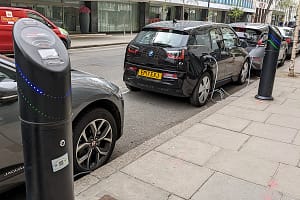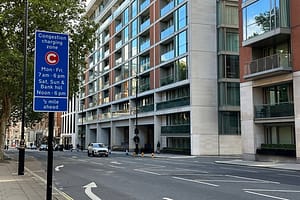With energy bills set to increase at the start of next month, millions of Electric Vehicle (EV) owners will see their costs rise, despite EVs being seen as a cheaper alternative to fuel vehicles.
The new energy prices increase the current cap by £35 to £1,755, meaning that millions of Brits will now have to pay even more for their gas and electricity. And, while the average EV driver will also now have to pay an extra two per cent to fully charge their vehicles at home, petrol prices have decreased by 21 per cent since 2022 for regular drivers. Brand new data from ChooseMyCar.com reveals that over half (51 per cent) of Brits no longer feel that owning an EV helps cut driving costs, due to rising electricity prices.
EV drivers may also no longer be exempt from paying a congestion charge from the start of next year. Instead, those driving an electric car would have to pay £13.50 every time they drive into central London, and tradespeople with larger vehicles would pay £9, as part of the new proposed congestion prices. Further data from ChooseMyCar.com found that over a third of Londoners (39 per cent) felt that it was unfair that EVs will be included in the new congestion charge.
But luckily, an automotive expert at ChooseMyCar.com has listed a number of top tips to help EV drivers prevent paying even more money. Whether it’s charging your EV at home, or charging and driving more efficiently, there are various ways that will help you save money, despite rising costs.
For example, it may be tempting to keep your EV fully charged whenever you’re not using it, especially before a long journey, but doing this can actually cost you more, alongside weakening your battery long-term. Instead, restricting your charging to just overnight, or stopping charging when your battery reaches 80 per cent, will give your EV the power it needs at a reduced cost.
Nick Zapolski, motoring expert and founder of ChooseMyCar.com, said that these simple steps will help prevent you paying even further costs to keep your EV on the road.
“Although EVs are seen as a cheaper alternative to fuel cars, the new energy price cap increase means that EV drivers will be paying more in electricity bills. At the same time, regular drivers are actually paying 21 per cent less for petrol than they were three years ago.
“However, even with new charges, there are still a number of simple steps that you can take to help prevent you paying even more to keep your EV running. Installing a charger at home, and charging at night for a shorter period of time, are some of the most effective money-saving methods. There are also still nearly 2,000 free charging stations in the UK, which are usually located near supermarket’s service stations, and hotels.
“And, even with the potential new charges, it’s worth noting that EVs are still cheaper to run than regular vehicles.”
Here’s ChooseMyCar.com‘s essential money-saving tips for EV drivers, “Public EV charging stations are convenient in certain situations, such as long journeys, but they’re also the most expensive way to charge your EV. It’s expected that you’ll pay over £1,000 a year for public station charging. If you wish to save money while charging your EV, install a 7kW charger at home to save over £400 a year. It’s worth noting, though, that both forms of charging are cheaper than filling up a car with petrol.
While it may be tempting to keep your EV fully charged whenever you’re not using it, this can amount to more costs, especially if they charge during peak times. And it can weaken your battery long-term. Instead, restrict your charging to just overnight. This will save you money, as many energy providers offer reduced rates during off-peak times, when demand for electricity is lower.
It may be tempting to fully charge your EV before your journey, but this will amount to higher costs, as well as wearing down your battery long-term. If you need to charge your EV before driving, stop at 80 per cent, if possible. The first and last 20 per cent take the longest to charge, so this is what will increase your charging fees the most.
Driving efficiently will help you drive for longer without needing charge, saving you money. Eco mode is a useful efficient feature, as it uses less power and reduced acceleration, meaning that, although you get up to speed slower, you can drive for longer without needing charge. Braking in good time is also recommended – EVs offer regenerative braking, which means the brakes convert energy back into electricity to maintain battery charge.
Although you will need to drive faster on some roads, higher speeds mean that more energy is needed for your car to accelerate. As a result, your battery will run out more frequently and you’ll have to spend more money charging it. A speed of between 55 and 60 miles-per-hour is best, when possible.
Although this may sound obvious, under-inflated tyres are the quickest way to reduce your EV’s mile range, as it will require more energy to keep your car moving. EV tyres are the most effective, as they’re built to be stronger, to support the extra weight of your battery. However, this does mean they’re more expensive if something goes wrong, so it’s recommended that you check the quality of your tyres every two weeks.
If you’re about to begin a long journey, it’s likely possible that you’ll need to charge your EV along the way. Plan your route around charging stations, as there are a total of 1,837 charging stations in the UK that are free to use. They’re usually located at places such as supermarkets, service stations, tourist attractions, and hotels (although you may need to be a guest).
If you are looking to buy an EV but are worried about the electricity bill increase impacting the costs for keeping one running, the Government is still offering grants to help you charge your vehicle at a reduced price, where you are provided with up to £350 to install a charger at home. Be warned, though, this grant looks set to send in March 2026, so, if you are looking to save further money by charging your EV at home, apply now.”






Leave a Comment